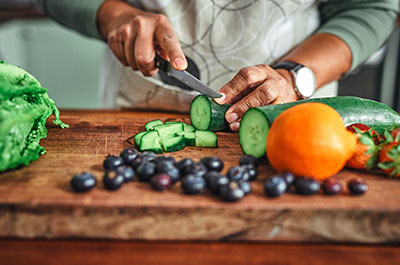Cholesterol is complicated. Just like Goldilocks, our bodies need a “just right” amount to function best. So when cholesterol runs high, many people turn to dietary solutions. In fact, ditching high-cholesterol foods such as butter, meat and shrimp is typically the first line of defense.
But according to Maria Conley, RDN, a registered dietitian nutritionist at Henry Ford Health, adding certain foods containing compounds called phytosterols (or plant sterols) may further help lower cholesterol levels. In most cases, phytosterols and stanols are only one part of a cholesterol-lowering strategy.
The Trouble With Cholesterol
Our bodies use cholesterol in a variety of ways. We need the waxy substance to protect our nerves, build cells and tissues and produce critical hormones, including estrogen, testosterone and vitamin D.
While there are several forms of cholesterol, these two get the most attention:
- Low-density lipoprotein, or LDL: Often called the “bad” cholesterol, LDL can build up on the walls of arteries and block blood flow.
- High-density lipoprotein, or HDL: This “good” cholesterol transports excess cholesterol back to your liver to be eliminated through waste.
Unfortunately, too much “bad” cholesterol can compromise health and increase the risk of heart disease and stroke. But phytosterols and phytostanols can help.

What Are Plant Sterols And Stanols?
Think of phytosterols and phytostanols as the plant world’s versions of cholesterol. Many fruits and vegetables naturally contain them (more than 250 types).
Although both phytosterols and phytostanols have a similar structure to cholesterol, they don’t boost your odds of developing heart disease. Instead, they compete with dietary and natural cholesterol for absorption—and they win.
So instead of cholesterol traveling into the bloodstream where it can gunk up your arteries, your body eliminates it as waste. “Studies consistently show that high intakes of phytosterols and stanols can lower total cholesterol and LDL-cholesterol levels by about 10 %,” Conley says.
Depending on your starting cholesterol levels—and the lifestyle changes you implement—you might still need cholesterol-lowering medications.
How Can I Get More Sterols In My Diet?
Unfortunately, our bodies can’t make phytosterols. We have to get them from food, and it can be tough to get the recommended 2 grams of phytosterols/stanols from diet alone.
Trace amounts of sterols and stanols are found naturally in whole grains, rice, apples, bananas, tomatoes, nuts, beans and legumes. But you would have to eat a lot of these foods to reach the 2 grams a day required to see a cholesterol change.
Because sterols and stanols have no taste, smell or negative mouth feel, manufacturers are increasingly adding them to foods. These foods include margarine-like spreads, orange juice, yogurt and granola bars (look for “added phytosterols” on the label).
Phytosterols As Part Of A Cholesterol-Lowering Strategy
Aim for 2 grams daily of phytosterols and stanols in combination with a heart-healthy, cholesterol-lowering diet, including plenty of fruits, vegetables, whole grains and healthy fat.
“The cholesterol-lowering effects of plant sterols and stanols taper off with intakes above 3 grams daily, so more is not better,” Conley says. “And sterols and stanols are not intended to replace cholesterol-lowering medications, especially for people who are at high risk of heart disease.”
If you’re considering adding phytosterols and stanols to your diet, talk to your cardiologist. Not everyone will benefit from incorporating phytosterol-fortified foods into their daily meals or taking a phytosterol supplement. “It’s important to select the right amount of phytosterols/stanols to meet your unique needs and ensure safety,” Conley adds.
Reviewed by Maria Conley, RDN, a dietitian who works with functional medicine patients at the Henry Ford Center for Integrative Medicine.



